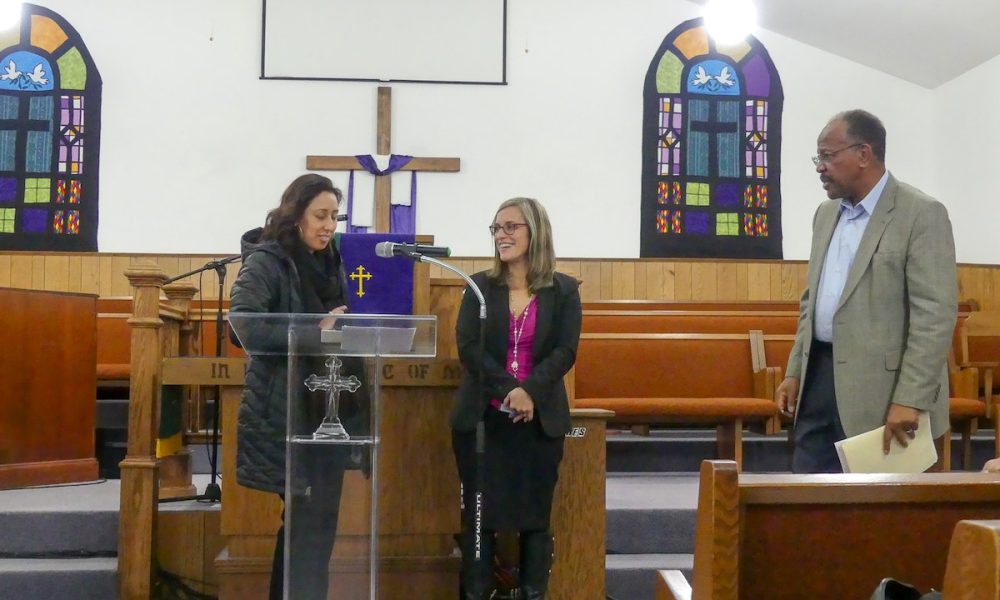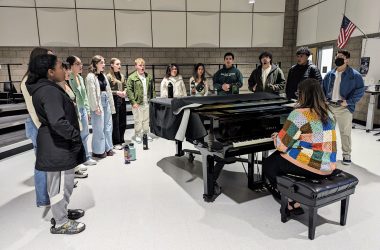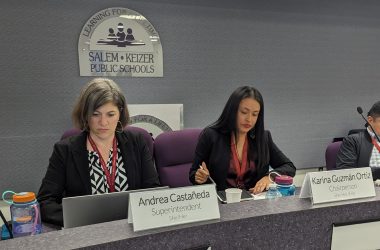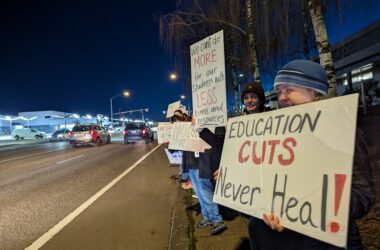
Adriana Miranda, left, answers questions about the Salem-Keizer School District’s boundary adjustment plan for NAACP President Benny Williams, right, as Superintendent Christy Perry looks on.
Hours before the Salem-Keizer School Board considers adopting new school attendance boundaries, Latino community groups are urging a delay to address concerns raised recently by the Salem-Keizer NAACP.
Benny Williams, the NAACP president, said his members remain concerned about low graduation rates among the district’s black students, particularly at McKay High School, where many of the changes are aimed.
Just over half of the district’s 47 black seniors graduated on time last year. At McKay, three out of seven received a diploma, according to state data.
Williams said he wants more conversation with district officials to understand how the boundary shifts would affect those students.
“What is that going to do by extension to the students who are failing out of it?” he said, referring to McKay.
In a statement Monday morning, the Salem Keizer Coalition for Equality, which works with Latino parents to involve them in schools, urged a delay “so the district can continue listening and reaching out to ALL voices” in light of the NAACP’s concerns. The group had previously supported the plan.
Also signing on to the statement were PCUN, a farmworker union, as well as Capaces Leadership Institute, Mano a Mano Family Center, Latinos Unidos Siempre, and Causa.
District leaders and community volunteers who worked on the boundary proposal answered questions posed by NAACP leaders at the organization’s meeting Monday night.
There, Superintendent Christy Perry said she shares Williams’ concerns about low graduation rates among black students, and the low number of black teachers and administrators in the district.
She said she’s been working with district staff to identify the causes and believes solutions need to start in elementary and middle school.
“It’s not an issue of a school. It’s an issue that’s starting much earlier in our system,” she said.
The boundary changes, she said, are separate from questions about student achievement and are intended to spread students move evenly around the district’s schools, especially high schools.
“It was purely a crowding issue,” she said.
But Williams said following the discussion he would still urge the school board to delay a vote. Other chapter leaders urged the district to consider student performance alongside the changes.
“How does the plan get us to the outcomes we expect?” asked Reginald Richardson, the group’s vice president.
The NAACP was among the 45 parents, teachers and community groups that worked for nearly four months to develop the plan, which would shift thousands of students, primarily in northeast and central Salem.
Shelly Ehenger, the NAACP secretary who represented the group on the boundary task force, said Monday questions she tried to raise about student performance went unanswered, something task force co-chair Adriana Miranda disputed.
Ehenger said she was also concerned by the number of parents of color who said they didn’t want their students moved to Sprague or West for high school because of concerns about racism.
“They felt that their children would not be welcomed or supported at those schools,” Ehenger said.
Miranda said she too has concerns about racism and segregation in Salem and wanted to continue to push the district, and the city, to address those issues.
But she felt questions about student performance were outside the scope of the task force, and said the plan submitted to the school board reflected outreach to parents in northeast Salem, especially the Latino community.
“My main responsibility was to advocate for our communities that are historically underrepresented,” she said. “I feel like we did all of that.”
Following the NAACP meeting Monday, Miranda said she still hoped to see the school board approve the plan.
Reporter Rachel Alexander: (503) 575-1241 or [email protected]
WILL YOU SUBSCRIBE? If you haven’t signed up for a digital subscription to Salem Reporter, please do so to support this kind of local news reporting, brought to you by a team of professional reporters. For $10 a month, you hire that team to work for you all month digging out the news of Salem. Sign up HERE.

Rachel Alexander is Salem Reporter’s managing editor. She joined Salem Reporter when it was founded in 2018 and covers city news, education, nonprofits and a little bit of everything else. She’s been a journalist in Oregon and Washington for a decade. Outside of work, she’s a skater and board member with Salem’s Cherry City Roller Derby and can often be found with her nose buried in a book.









